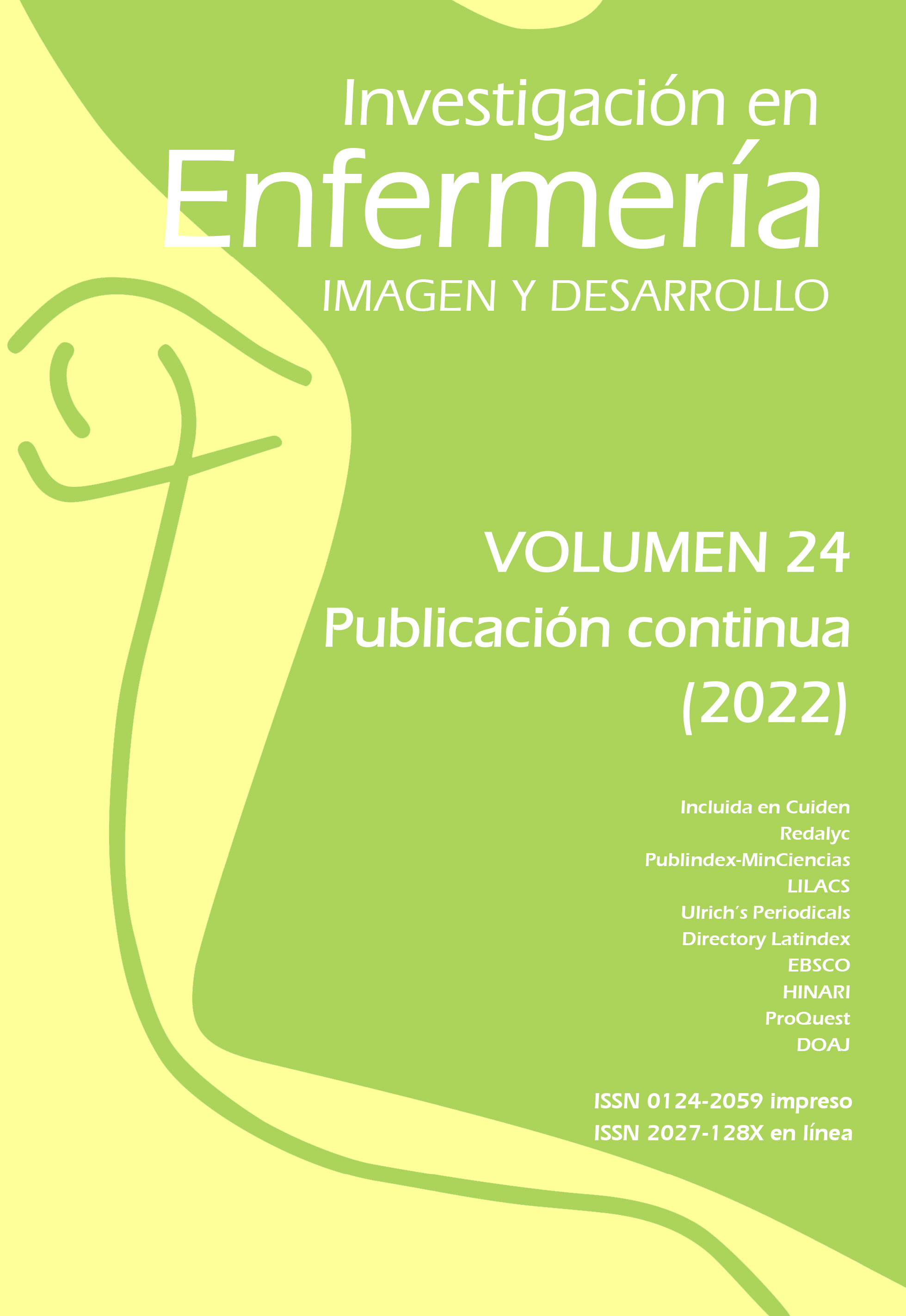Resumen
Introducción: en Enfermería el reconocimiento de los patrones emancipatorio y sociopolítico en la práctica no es evidente. Esta identificación permite la cualificación del cuidado en áreas de gran complejidad como la oncológica, que afecta a población infantil y a sus familias. Objetivo: conocer el significado de los patrones de conocimiento sociopolítico y emancipatorio en los profesionales de Enfermería durante el cuidado de los niños con cáncer y sus familias. Metodología: estudio cualitativo etnográfico en el que se realizaron entrevistas semiestructuradas a diez enfermeros con experiencias entre los seis meses y diecisiete años trabajando con población oncológica pediátrica. Y observaciones no participantes en dos instituciones de salud, una privada y otra pública. Los datos se estudiaron bajo el procedimiento de análisis propuesto por Michael Angrosino, que consta de las fases: gestión de datos, lectura general y clasificación de temas. Resultados: como producto del análisis de la información se establecieron tres grandes temas: contexto de cuidado; cuidado de enfermería; y expresiones de los patrones sociopolítico y emancipatorio en el cuidado. En la discusión se articularon los resultados con la teoría de Sistemas de Imogene King. Conclusiones: a partir de la interacción de los enfermeros con los pacientes y sus familias se logró identificar que estrategias como la educación, el seguimiento, la gestión de casos y de trámites administrativos son formas de fortalecer la gobernanza compartida y la equidad social, los cuales son índices de credibilidad de los patrones sociopolítico y emancipatorio.
(1) Durán de Villalobos MM. La ciencia, la ética y el arte de enfermería a partir del conocimiento personal. Aquichan. 2005;5(1):86-95.
(2) Martínez-Rodríguez A, Martínez-Faneca L, Casafont-Bullich C, Olivé-Ferrer MC. Construction of nursing knowledge in commodified contexts: A discussion paper. Nurs Inq 2020;27(2). doi: 10.1111/nin.12336
(3) Chinn P, Kramer M. Integrated theory and knowledge development in nursing. 8 ed. St. Louis: Elsevier; 2011.
(4) Constantinides SM. Compassionate Knowing: Building a Concept Grounded in Watson’s Theory of Caring Science. Nurs Sci Q 2019;32(3):219-25. doi: 10.1177/0894318419845386
(5) Organización Mundial de la Salud. El cáncer infantil. Datos y cifras [Internet] [citado 2020 abr 12]. Disponible en: https://www.who.int/es/news-room/fact-sheets/detail/cancer-in-children
(6) Libman R, Sherrod B, Weyant D. Nurses’ education to support school reentry for children with cancer. Pediatr Nurs 2017;43(6):275-82.
(7) Consejo Internacional de Enfermería. Definición de Enfermería. Disponible en: https://www.icn.ch/es/politica-de-enfermeria/definiciones
(8) Gerrish K, Lacey A. Investigación en Enfermería. 5 ed. Oxford: McGraw Hill; 2008.
(9) Morse J. The significance of saturation. Qual Health Res. 1995;5(2):147-9.
(10) Angrosino M. Etnografía y observación participante en investigación cualitativa. Madrid: Morata; 2012.
(11) Arias Valencia MM, Giraldo Mora CV. El rigor científico en la investigación cualitativa. Investigación y Educación en Enfermería. 2011;29(3). Disponible en: https://www.redalyc.org/articulo.oa?id=105222406020.
(12) Ministerio de Salud. Resolución 8430 de 1993 [Internet] [citado 2020 abr 12]. Disponible en: https://www.minsalud.gov.co/sites/rid/Lists/BibliotecaDigital/RIDE/DE/DIJ/RESOLUCION-8430-DE-1993.PDF
(13) Ezekiel E. ¿Qué hace que la investigación clínica sea ética? Siete requisitos éticos. Pautas Éticas de Investigación en Sujetos Humanos: Nuevas Perspectivas. Chile: Programa Regional de Bioética OPS/OMS; 2003.
(14) Significado. Contexto [Internet] [citado 2020 abr 12]. Disponible en: https://www.significados.com/contexto/
(15) King I. Enfermería como profesión: filosofía, principios y objetivos. MéXico: Limusa, 1984.
(16) Raile Alligood M, Marriner Tomey A. Modelos y teorías en enfermería. 7 ed. Barcelona: Elsevier; 2011.
(17) Watson J. Advocacy and collaboration: Advancing cancer prevention and screening. Clin J Oncol Nurs 2020;24(5):39-44. doi: 10.1188/20.CJON.S2.39-44
(18) Kanninen T, Häggman-Laitila A, Tervo-Heikkinen T, Kvist T. An integrative review on interventions for strengthening professional governance in nursing. J Nurs Manage 2021;29(6):1398-1409. doi: 10.1111/jonm.13377
(19) Caruso A, Vigna C, Bigazzi V, Sperduti I, Bongiorno L, Allocca A. Burnout among physicians and nurses working in oncology. Med Lav 2012;103(2):96-105.
(20) Shahzad S, Younas A, ALI P. Social justice education in nursing: An integrative review of teaching and learning approaches and students' and educators' experiences. Nurse Educ Today 2022;110. doi: 10.1016/j.nedt.2022.105272

Esta obra está bajo una licencia internacional Creative Commons Atribución 4.0.
Derechos de autor 2022 Investigación en Enfermería: Imagen y Desarrollo


